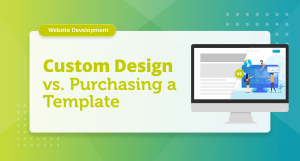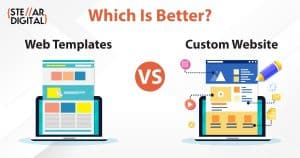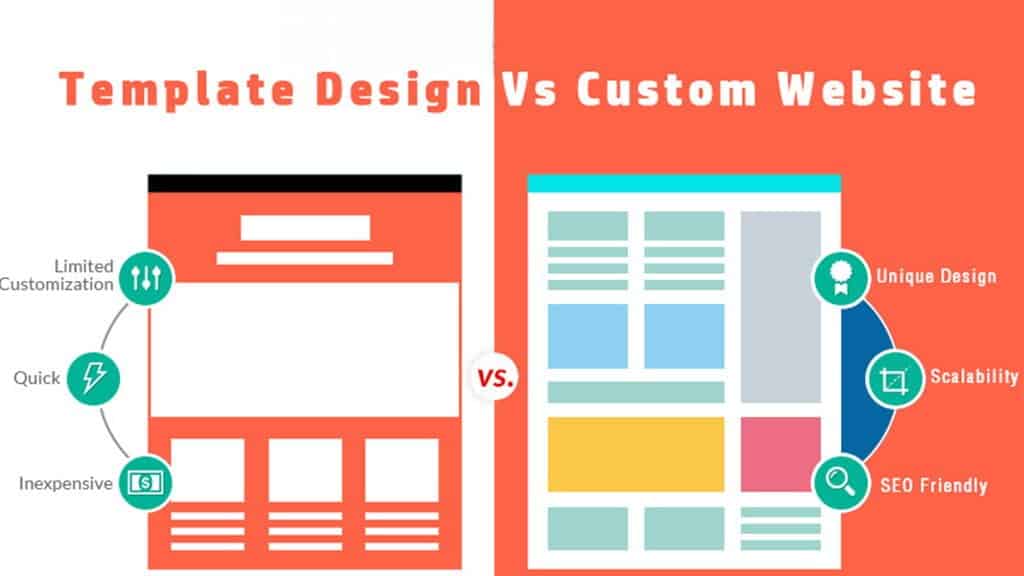The Benefits of Custom Web Design vs. Templates
When it comes to building a website, business owners and marketers are often faced with the decision of whether to choose a custom web design or use pre-made website templates. Both options have their benefits and drawbacks, and the choice largely depends on the business’s goals, budget, and overall needs. In this article, we will explore the key differences between custom web design and templates, and help you determine which option is best suited for your business.
Understanding Custom Web Design
Custom web design refers to creating a website from scratch, where every aspect of the design and functionality is tailored specifically to the needs and goals of the business. Unlike templates, which use pre-designed layouts and features, a custom web design is completely unique. This type of design is built by professional web designers who work closely with the client to ensure that the website not only looks great but also provides a seamless user experience.
What Sets Custom Web Design Apart?
The most significant difference between custom web design and templates is the level of personalization. With custom design, every element, from the colors to the layout and even the functionality, is designed specifically for the brand’s identity. Some key features of custom web design include:
Unique Brand Identity: A custom design allows businesses to fully incorporate their branding elements, such as logos, color schemes, and fonts, into the design. This ensures a website that reflects the essence of the brand and stands out in a crowded marketplace.
Tailored User Experience: A custom web design can be structured to provide the best user experience for your target audience. Designers can consider factors such as customer behavior, user flow, and accessibility, which ensures that the website meets the needs of its visitors.
Flexible Functionality: Custom websites are highly flexible and can accommodate any feature or functionality a business needs. Whether it’s an e-commerce platform, membership system, or advanced search options, custom designs allow developers to integrate specific features as needed.
Exploring Website Templates
Website templates are pre-designed website layouts that can be used as a foundation for creating a website. These templates are available through various content management systems (CMS) such as WordPress, Wix, and Squarespace, and can be customized to some extent to suit a business’s branding and needs. Templates are often chosen by businesses looking to save time and money on the design process.
Advantages of Website Templates
Website templates are a popular choice for businesses that need to build a website quickly or have a limited budget. Here are some of the primary benefits of using website templates:
Quick and Easy Setup: One of the biggest advantages of templates is that they allow for rapid website creation. Since the layout and design are already pre-made, the process of setting up the website is much quicker compared to a custom design.
Cost-Effective Solution: Templates are significantly more affordable than custom web designs. Since the design is pre-made and the development process is more streamlined, the cost of using a template is often a fraction of the price of custom web development.
Easy Customization: While templates come with pre-defined layouts, most of them allow for some degree of customization. Users can change colors, fonts, and images to make the website more in line with their branding. This flexibility allows businesses to make some adjustments without needing advanced technical skills.
Key Differences Between Custom Web Design and Templates
While both custom web design and website templates have their merits, understanding the key differences can help businesses make an informed decision based on their specific needs.
1. Design Flexibility
Custom web design offers a level of flexibility that templates simply cannot match. With a custom design, every aspect of the website can be tailored to the unique needs and goals of the business. Whether it’s custom navigation, unique layout features, or a highly interactive user interface, custom web design provides the flexibility to bring any vision to life.
On the other hand, templates are limited in terms of design flexibility. Although many templates allow for minor customization, the overall layout and structure are pre-determined. Businesses are constrained by the template’s existing framework, which may not be ideal for unique branding or specific functionality needs.
2. Branding and Personalization
Custom web design allows businesses to fully personalize their website to align with their brand identity. Every design choice can reflect the business’s values, personality, and style, creating a cohesive and memorable experience for visitors. This is especially important for businesses that want to differentiate themselves in a competitive market.
With templates, personalization is limited. Although templates can be adjusted to reflect the brand’s colors and logo, the structure and elements of the design remain largely the same. As a result, a template-based website may look similar to many other sites using the same template, which could negatively impact the perception of the brand.
3. SEO and Performance Optimization
Custom web designs are often built with search engine optimization (SEO) and performance in mind. A custom website can be optimized for fast loading speeds, mobile responsiveness, and SEO best practices, all of which can enhance a website’s performance in search engine rankings.
Templates, while often SEO-friendly, are typically built with a more general approach in mind. As a result, they may not be as optimized for performance or SEO as custom websites. Additionally, some templates can include unnecessary code or bloated features that may slow down the site or negatively affect its SEO performance.
4. Ongoing Maintenance and Support
Custom websites are typically built with ongoing support in mind. Most web development agencies offer maintenance services that include regular updates, security patches, and troubleshooting. This ensures that the website continues to function smoothly and securely over time.

With templates, ongoing support and maintenance are usually limited to the template provider or CMS platform. If the template becomes outdated or needs significant modifications, businesses may face challenges in finding appropriate support.
5. Cost Considerations
Cost is one of the most significant factors when choosing between custom web design and templates. Custom websites are generally more expensive due to the level of personalization and the time involved in creating a unique design. The cost will also include ongoing development and support.
Templates, on the other hand, are significantly cheaper. Many CMS platforms offer free templates, and premium templates are often available at a low cost. However, businesses should consider the long-term costs associated with template limitations, such as the potential need for a redesign in the future.
Which Option is Best for Your Business?
Ultimately, the decision between custom web design and templates comes down to your specific needs, goals, and budget. Custom web design is ideal for businesses looking for a unique, fully tailored website that will help them stand out in a competitive market. It’s especially well-suited for businesses with complex functionality needs or those looking to scale their website over time.
Website templates are an excellent option for small businesses or startups that need to get online quickly and affordably. Templates can also be a good solution for businesses with simple website needs or those looking for a temporary website solution.
Conclusion
Both custom web design and templates offer distinct advantages, and the best option depends on your business’s unique needs. Custom web design offers greater flexibility, personalization, and long-term growth potential, while templates are cost-effective and quick to implement. Consider your goals, budget, and future needs when deciding which option is the right fit for your website.






